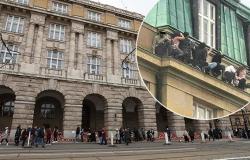More presidential nominations for the Constitutional Court, more doubts. On Monday, Petr Pavel proposed to the Senate to send lawyer and sociologist Jiří Přibán and Tomáš Langášek, judge of the Supreme Administrative Court (NSS), to the ÚS. Some of the members of the upper chamber, however, do not like the fact that another judge should come with Langášek, again directly from the NSS. According to critics, this goes against the variety announced by the president, which should be among the main selection criteria. It is not the first time that Pavlo’s method of selecting new constitutional judges has come under scrutiny.
In June, the mandate of Deputy Chairman of the ÚS Vojtěch Šimíček and Judge Tomáš Lichovník will end. Pavel therefore had to come up with new proposals these days. It needs the approval of the Senate, and the upper chamber must decide on the nominations within 60 days.
Prague Castle itself swears by the fact that, as in the past, it followed the established rules. “The selection of candidates took place according to the pre-announced criteria that the President published on March 20,” the press release reads. The very first criterion is “Variety in terms of professional background and experience, with the usual predominance of general court judges and academics, supplemented by other professionals”.
However, according to some senators, the president is going against this principle with Langášk’s nomination. Like the head of the Constitutional Court, Josef Baxa, Langášek originally came from the Supreme Administrative Court.
“Mr. Langášek is a great judge and I have nothing against his nomination. In fact, the Castle’s original proclamation that the new ÚS will be diverse denies this. He is already the fourth candidate from the NSS, there is no one from the NS (Supreme Court – note). It seems that one court is popular and the other is not. And no one can suggest to me that I don’t like the NSS, because I very strongly defended the candidacy of judge Zdenek Kühn, whose panel at the NSS rejected several times more cases where I figured as a tax advisor, than all other panels of the NSS combined. I just imagine variety differently than the presidential office. And it’s the same with the absence of conservative judges,” Tomáš Goláň, the head of the constitutional and legal committee of the Senate, which will discuss Langášek’s nomination, wrote for Echo24.
“The doubt is there, they are people from the same background. They know each other. (…) Mainly the president or his team declared that the selection should be varied,” argued Senator Hana Kordová Marvanová, vice-chair of the committee. “They should be different personalities who are also independent of each other and are not from the same environment, one opinion group. Of course, it depends on the hearing. We have to talk to those candidates,” adds Marvanová.
Other senators also admit that it can be a problem. “I understand the reservations, but at the moment I don’t yet know how they will affect my vote,” senator and lawyer Václav Láska told the editors.
Lawyers are missing
The method of selecting candidates for the Constitutional Court was already discussed earlier. President Pavel decided to create his own advisory panel led by constitutional lawyer Jan Kysela, which will accept nominations from individual institutions and then generate specific names. Some critics called it unnecessary corporatism.
“The composition of the Constitutional Court in terms of professions is the key to change. I propose to make it up of 5 lawyers, 3 legal theorists, 3 judges and 4 politicians (for those who jump right in, politicians who can come from any legal experience that is prescribed by the constitution). Then the Constitutional Court will look completely different and perhaps it will return to the mission that the creators of the Constitution had in mind when they wrote it, especially in terms of the role of the Constitutional Court as a specific body in our legal and political system,” criticized the selection, for example the recently deceased head of the Helsinki Committee Václav Vlk.
There was also some dissatisfaction with the situation where almost exclusively judges appeared in the nominations and other professions were overlooked.
“Lawyers represent the most numerous legal status, they represent and are in contact with the most people who are consumers of law. They must respect the hierarchy of the state, but also be able to fight with it – always and consistently only in the legal field. The ratio of lawyers to judges is about seven to one, and the ratio to prosecutors is about 18:1 in favor of lawyers. For law professors, it is estimated to be 500 lawyers for one professor,” Vlk added at the time.
Similar to Havel
According to representatives of individual institutions or experts in constitutional law, Pavel continues the era of the first president by striving for openness and diversity in the selection of judges. “I feel that it fits into the customs that have been around since Václav Havel,” says Libor Vávra, president of the Judicial Union. “Václav Havel had a list of candidates that he collected around the area, and his advisory group then narrowed down the selection,” he added.
According to Jan Kysela, who is currently leading Pavlo’s panel of experts, Václav Klaus had a similar advisory board, but it did not function as under Havel. “In relation to the Constitutional Court, it served as a reservoir of candidates when three of its members were immediately nominated to be its judge. Otherwise I found it very random. It was usually the case that someone close to Václav Klaus heard about someone and the person in question was proposed. Other times, party ties, recommendations from ODS functionaries and the like also worked,” he said.
“It was like that with Miloš Zeman from the beginning,” adds judge Vávra. The President of the Constitutional Court, Pavel Rychetský, strongly advised the third president at the beginning of his first mandate, but warm relations cooled over time. “Only after his disagreement with Pavlo Rychetský did the president retreat from it, and then we didn’t know much about his progress,” said the president of the Judicial Union.
In more than a year in office, Pavel appointed eight new judges of the Court of Justice and its chairman, Josef Baxa. Lawyer Milan Hulmák last expanded the ranks of the court in February. Last year, on the other hand, the judge of the Supreme Court in Prague, Robert Fremr, withdrew his candidacy when his controversial judgments from before 1989 appeared. After him, judge Pavel Simon also failed, for whose candidacy not enough senators raised their hands.
According to the president, the selection was nevertheless responsible and transparent. “I have done something that none of my predecessors have done. I said how, on the basis of what criteria and parameters (constitutional judges) will be selected, I announced the circle of people with whom I will cooperate on the selection, whose expertise I will rely on,” said Pavel recently.
Tags: court popular Pavlos names Constitutional Court stirred doubts Senate
-




